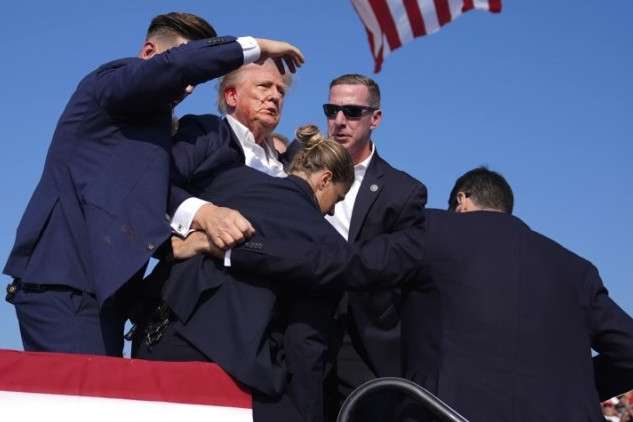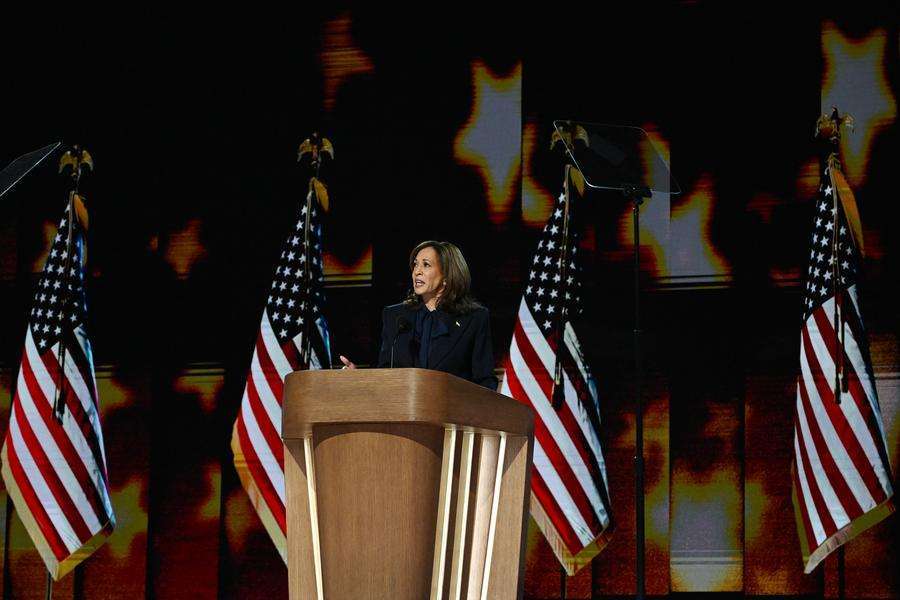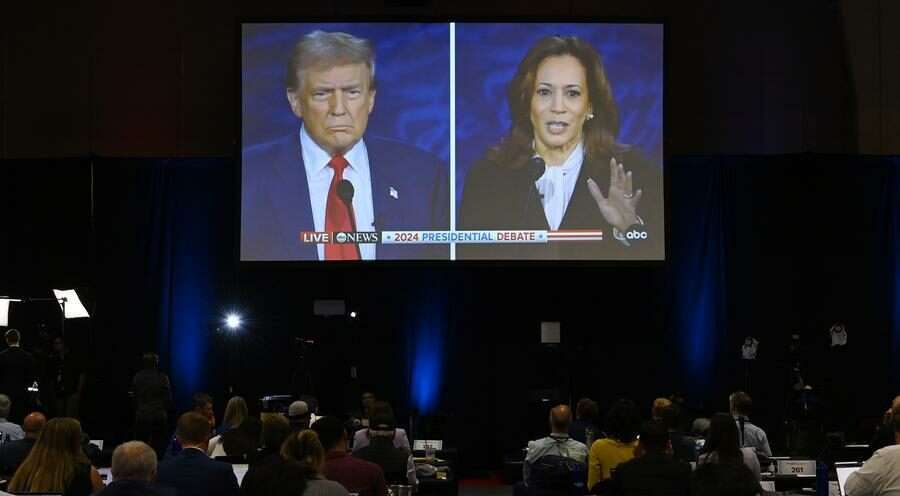The US presidential election in 2024 is full of surprises and every month brings chaotic "surprises". US media predict that the election will be the "most divisive" in history. As election day approaches, the tense political atmosphere that keeps the American public on edge will only grow.
The American Psychological Association's annual poll in October revealed that the election has become a significant source of stress for Americans, who fear that the election results could spark political violence and even lead to the "end of American democracy."
JANUARY: GUNS ON IMMIGRANTS
In January, the US federal government and the Republican-led state of Texas clashed over immigration. The Texas Army National Guard erected barriers such as barbed wire fences on the US-Mexico border to prevent immigrants from entering.
Meanwhile, it also prevented federal police officers from entering, causing the standoff between the two sides to briefly degenerate into an armed confrontation.
The "border crisis" highlights the conflict and divide between the Democratic and Republican parties on immigration. Previously, Republican-led states such as Texas and Florida have repeatedly bused or flown undocumented immigrants into Democratic-ruled cities, using these actions as a weapon against the Democratic Party.
Barbed wire fences and buses carrying immigrants have become a symbol of partisan strife in the United States as politicians of both parties continually politicize the issue and seek selfish advantage at the cost of further dividing American society.
FEBRUARY: SNEAKER DEALER
On 17 February, former US President Donald Trump made an appearance at a shoe expo in Philadelphia, Pennsylvania, where he unveiled his own sneaker brand. Priced at 399 US dollars, only 1,000 limited edition pairs were available.
The day before, Trump received an unprecedented fine from the state of New York, where a judge ruled that Trump must pay a fine of approximately $355 million for exaggerating his net worth to deceive banks into giving him better loan terms.
Trump's fine should have made headlines, but it was unexpectedly trumped by "Trump sells shoes". Vanessa Friedman, chief fashion critic for The New York Times, wrote in her article: "We all thought it was true: "It's easy to get distracted by the sheer absurdity of it all - a former president selling sneakers!"
Given that sneaker culture is popular in the United States, especially among young people and African-Americans, the Trump campaign hoped to attract more young and minority voters, especially African-American men, according to an Associated Press article.
MARCH: LEAVING THE CONGRESS
On March 22, the Republican federal congressman from Colorado officially resigned Ken Buck, ending his tenure in Congress several months early.
Buck, who has served as a congressman for more than nine years, criticized the dysfunction on Capitol Hill in an interview with CNN. "This place has devolved into bickering and nonsense, not working for the American people," He said.
"It's the worst year in the nine years and three months that I've been in Congress, and when I talk to former members, it's the worst year in the last 40, 50 years that I've been in Congress," He said.
According to a March report by the American Broadcasting Company (ABC), 48 members of the current U.S. Congress have resigned or announced their intention to resign, representing 11 percent of the total number of representatives and surpassing the number from previous years.
The Washington Post reported that in the last 40 years, there have never been so many members of Congress who have voluntarily ended their terms early without planning to continue in other public offices.
Many of the outgoing legislators attributed their resignations to bitter party fights and internal disputes within their parties. The two major parties have engaged in a constant cycle of attacking and obstructing each other on issues ranging from gun control to illegal immigration, resulting in a longstanding failure to address social problems that continue to escalate.
This wave of resignations from Capitol Hill largely reflects the growing disillusionment of those at the top of American politics with the country's political system.
APRIL: THE "CIVIL WAR"
The American film "The Civil War", which was released in theaters on April 12, depicts a doomsday scenario in which the United States is once again plunged into civil war.
Although fictional, the film reflects the current reality of division and opposition in the United States and reflects the concerns of the American people.
Rolling Stone magazine said the film represents "a future so not too distant that you might mistake it for the present, in which the US is once again at war with itself".
The Atlantic magazine said it was "a narrative that resonates uncomfortably in today's politically polarised times".
In recent years, the United States has experienced political turmoil, governance problems and slow institutional functioning, with extreme behaviour and chaotic situations becoming the norm.
"The United States is more divided along ideological and political lines now than at any time since the 1850s," He said Bruce Stokes, associate at Chatham House. "America's friends and allies must understand that the United States has become a Divided States. In fact, there are two Americas - and they are at war," He said.
MAY: GUILTY EX-PRESIDENT
On May 30, a jury in a Manhattan, New York court ruled that Trump violated New York state law by concealing a $130,000 "hush money" payment to an adult film actress and falsifying business records during the 2016 U.S. presidential election. He was convicted of 34 felony counts.
It was the first time in U.S. history that a former president had been indicted or convicted in a criminal proceeding.
Trump said it was a "witch hunt" and a "political attack" by the Democratic Party. Republicans also took the opportunity to criticise the unfairness of the US judicial system, describing it as politicised and weaponised.
"Divided", "outraged" and "concerned"... These are the words the American media and pundits have chosen to use when discussing this year's election.
Against the backdrop of political polarisation, the confrontation between the Democratic and Republican parties continues to escalate, and Trump's "historic" condemnation is undoubtedly deepening the discord between the two parties.

JUNE: THE "POLITICISATION OF THE COURTROOM"
On June 11, a 12-member jury in the U.S. state of Delaware found Hunter Biden, son of U.S. President Joe Biden, guilty of three federal gun charges, the first time a child of a sitting president has been convicted of a felony.
Hunter's conviction has fuelled the mutual attacks between Democrats and Republicans and escalated the already tense atmosphere of the US presidential election. Hunter and Trump, now both convicted, claim they are victims of political persecution.
"This trial was nothing more than a distraction from the real crimes of the Biden crime family," a spokeswoman for the Trump campaign said in a statement Karoline Leavitt.
"The case continued a trend in which the courtroom has become an extended arm of the election campaign," CNN reported.
"In an era of strong political polarisation, we could be embarking on a dangerous path. Just the perception of politicization of the judiciary would be incredibly damaging, let alone the realityand," she added.

JULY: ASSASSINATION ATTEMPT
On July 13, Trump was the target of an "assassination attempt" while giving a speech during a campaign rally in Butler, Pennsylvania. A few days later, Trump officially accepted the nomination and became the third Republican presidential candidate.
In a post on his Truth Social network, Trump said he was shot by a bullet, "that pierced the top of my right ear."
"I knew immediately that something was wrong because I heard a whizzing sound, gunshots and immediately felt the bullet pierce my skin," he said.
The attack was the most serious attempt to assassinate a president or presidential candidate since Ronald Reagan was shot in 1981, the Associated Press reported, adding that the attack drew fresh attention to fears of political violence in the deeply polarized United States.
"This is the worst kind of event that can happen in this environment, and I deeply fear that it portends much more political violence and social instability to come," He told Ian Bremmer, president of Eurasia Group, a political risk research and consulting firm, in a video posted on X, formerly Twitter.
Given Americans' perception of an existential threat to democracy, he said, the willingness to use violence may be greater than at any time since 1968, when Martin Luther King Jr. and Robert Kennedy were assassinated, and perhaps even since the Civil War.
AUGUST: 'FORCED' WITHDRAWAL
On August 22, U.S. Vice President Kamala Harris officially accepted the Democratic Party's presidential nomination at the Democratic Party National Convention held at the United Center in Chicago, "resetting and reshaping" this year's U.S. presidential election.
Biden was "forced" to withdraw from the race on July 21 under pressure from party leaders, lawmakers and donors.
Prior to Biden's resignation, he and Trump traded accusations, each claiming the other was a "threat to American democracy." After Harris stepped in, she criticized Trump's policy proposals while repeatedly pointing to his criminal history, saying it would lead the US into "chaos, fear and hate."
In response, Trump has repeatedly claimed that Harris lacks "legitimacy" as the Democratic presidential nominee.
Amid the intense attacks between the two camps, the US media and pundits believe that Harris and Trump will wage a protracted "duel" with each other to the end, with the conflict between them serving as a microcosm of the nation's division.
"When this is over, no matter who wins, we will be even more divided, with our fragile democracy and the unity of the country even more at risk," He said James Zogby, president of the Washington-based Arab American Institute.

SEPTEMBER: A POLARISING DEBATE
On September 10, Harris and Trump faced off for the first time in a debate on the 2024 US presidential election in Philadelphia.
During the debate, which was scheduled to last 90 minutes, Harris spoke for a total of 37 minutes and 41 seconds, 17 minutes and 25 seconds of which were spent attacking Trump. Trump, on the other hand, spoke for 43 minutes and 3 seconds, with 12 minutes and 54 seconds devoted to attacks on Harris, according to the New York Times.
As the electoral contest enters its "final sprint," this election "reality show" highlights the growing political divisions and polarization in the United States.
For several years now, a perfect storm has been brewing - fueled by extreme polarization, political violence, historic prosecutions and rampant misinformation, US news website Axios reported, adding that chaos is sure to rain down in November.
OCTOBER: BIG MONEY
On 19 October, US billionaire Elon Musk presented a cheque for $1 million to an attendee at a rally in Harrisburg, Pennsylvania, to support Trump. He also announced a plan to give away a million dollars every day until 5 November to a randomly selected person who signed his political action committee's petition.
Musk, the world's richest man, has donated more than $75 million to his pro-Trump super political action committee (PAC), according to CNN.
The money is the latest example of Musk using his extraordinary wealth to influence the tense presidential contest between Trump and Harris, Reuters reported.
After decades of sitting on the sidelines of politics, Bill Gates, one of the world's richest men, privately said he recently donated about $50 million to a nonprofit organization that supports Harris' presidential bid, The New York Times reported on Oct. 22.
By October 30, Forbes magazine recorded 83 billionaires supporting Harris and 52 billionaires supporting Trump. While many other billionaires may also financially support the candidate, we won't know their donations until after the election.
The 2024 presidential election is on track to be the most expensive in history.
According to OpenSecrets, a nonprofit that tracks and publishes campaign finance and lobbying data, the presidential campaigns of both major parties, their associated super PACs and other related groups will spend more than $15.9 billion over the course of the 2024 election cycle, breaking the 2020 record of $15.1 billion.
This is again illustrated by a famous quote from former California Assembly Speaker Jesse Unruh in 1966: money is the mother's milk of politics.
Xinhua/ gnews - RoZ
PHOTO - Xinhua/Li Rui, Aaron Schwartz



